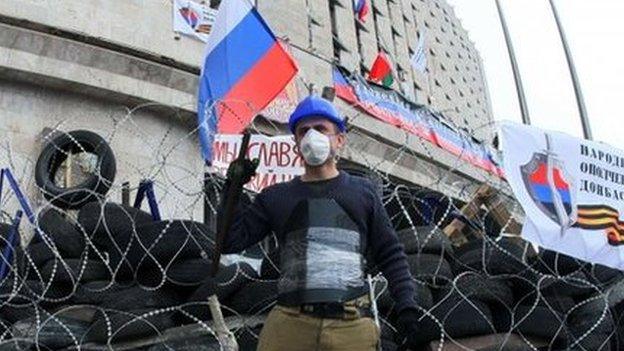US urges countries to help Ukraine's economic rescue
- Published
- comments
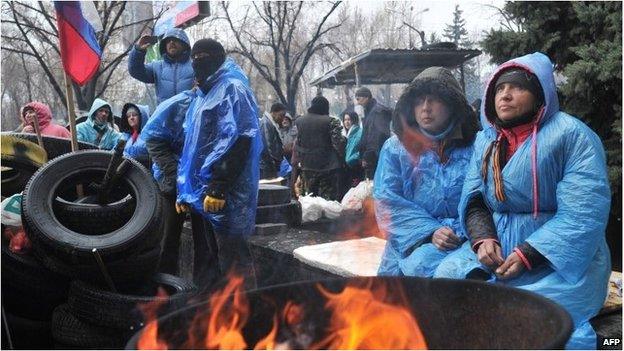
Protests continue in Ukraine, but its economy needs international help, says the US
US Treasury Secretary Jacob Lew has urged other countries to contribute more to the economic rescue of Ukraine.
He told the International Monetary Fund (IMF) that Ukraine's "sizeable financing needs" meant other nations must add to its $1bn (£597m, 720m euros) loan guarantee.
The appeal came as Ukraine's interim prime minister offered to devolve more powers to eastern regions.
Pro-Russian separatists there are defying the government.
Meanwhile, Washington on Friday announced a third round of sanctions against individuals it has linked to Russia's annexation of Crimea.
The US Treasury said it had frozen the US-based assets of one former Ukrainian official, a Crimea-based energy firm and six Crimean leaders, including the chairman of the Crimea electoral commission and the mayor of Sevastopol.
Immediate steps 'critical'
Mr Lew says the US is "bolstering the IMF program through a complementary aid package, which includes a $1bn loan guarantee and additional technical assistance," in a statement, external to the IMF.
"It is critical that the international community - multilateral development banks and bilaterals - take immediate steps to also support the IMF program by providing financing support, given the sizeable financing needs," he adds.
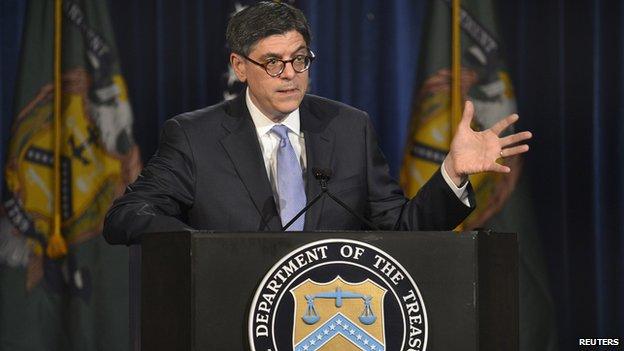
US Treasury Secretary Jack Lew has described Russia's annexation of Crimea as "illegal and illegitimate"
The IMF announced a rescue package worth as much as $18bn last month in a bid to aid Ukraine's economy, and this has been bolstered to $27bn with contributions from Europe and the US.
In exchange, the IMF has demanded from Ukraine strict government spending cuts and tax increases.
Ukraine is being squeezed by Russia's decision this month to stop providing Ukraine with subsidised natural gas.
That discount had been agreed between Russian President Vladimir Putin and Ukraine's then President Viktor Yanukovych, in which Russia also said it would buy $15bn-worth of Ukrainian government bonds.
Interim Ukrainian Prime Minister Arseniy Yatsenyuk: "We've made an offer... but it's up to them [the separatists] to decide"
Separately on Friday, Ukraine's interim Prime Minister Arseniy Yatsenyuk offered to devolve more powers to the east of the nation and is holding talks with regional leaders in Donetsk, where activists demanding self-rule had occupied a government building.
The separatist protests in Ukraine's eastern cities follow Russia's annexation of Crimea last month - described as the biggest political confrontation in Europe since the end of the Cold War.
The IMF is also asking Ukraine to crack down on corruption and end central bank support for the Ukrainian currency.
Ukraine's new government has said it needs $35bn to pay its bills over the next two years.
Ukraine has not paid off its debt to Russian gas supplier Gazprom despite the passing earlier this week of a deadline for the nation to start reducing its debt. Gazprom says Ukraine owes it $2.2bn.
European Energy Commissioner Guenther Oettinger told Austria's ORF radio he was working on a plan to help Ukraine pay its gas bills to ensure its debts do not rise.
Gas supplies
On Friday, President Putin moved to assure the EU it would not cut off gas supplies. Brussels said it would stand with the new authorities in Kiev if the Kremlin carries out a threat to turn off the tap to Ukraine.
"I want to say again: We do not intend and do not plan to shut off the gas for Ukraine," Mr Putin said in televised comments at a meeting of his advisory Security Council, the Reuters news agency reported.
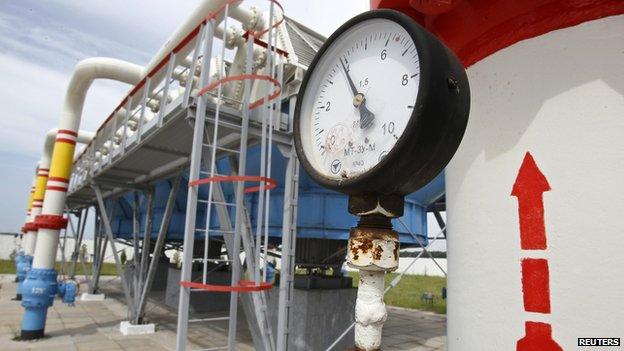
The EU says it can pump gas back to Ukraine using reverse-flow pipeline technology
Russia has turned off the gas tap to Ukraine before, in 2006 and 2009. As the 2009 row escalated, gas supplies to Europe through Ukraine were suspended for two weeks.
But Russia may be reluctant to do it again as it is dependent on revenue from EU customers.
The EU and US have imposed sanctions on a number of Russian and Ukrainian officials in response to Russia's annexation of Crimea.
The US Treasury says its latest round of sanctions target the US-based assets of one former Ukrainian official, a Crimea-based energy firm and six Crimean leaders, including the chairman of the Crimea electoral commission and the mayor of Sevastopol.
Talks between Russia, Ukraine, the US and the EU - the first four-way discussions since the crisis began - are scheduled to take place on 17 April in Geneva.
- Published16 June 2014
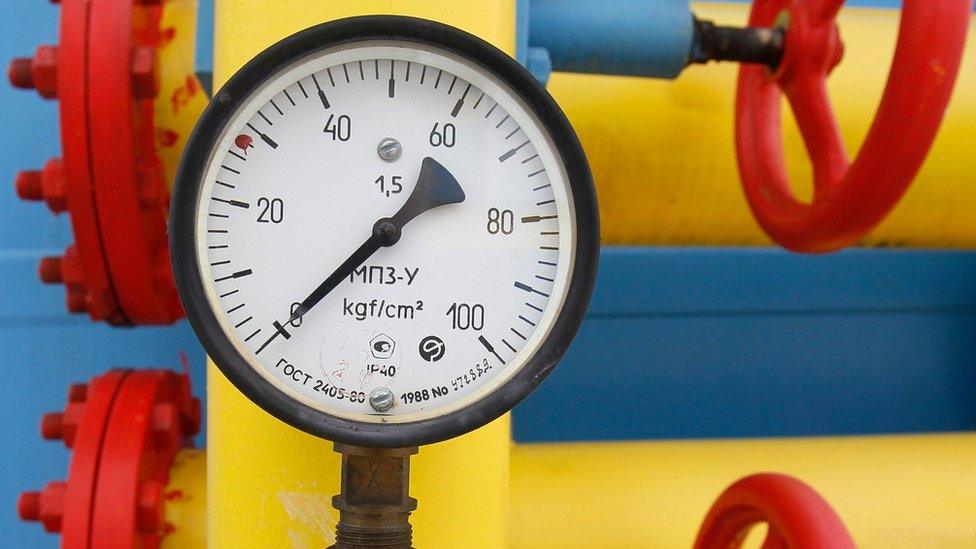
- Published1 April 2014
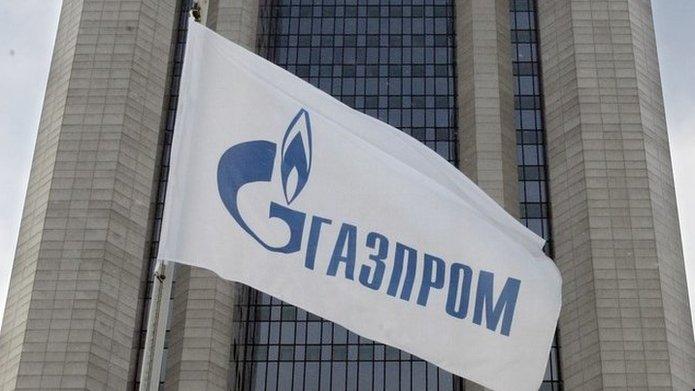
- Published1 May 2014
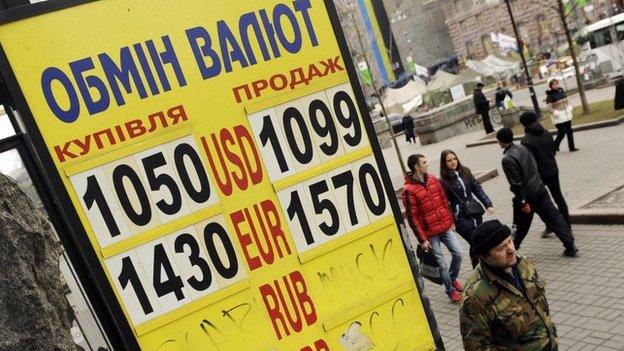
- Published11 April 2014
